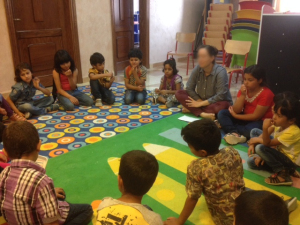“What are some feelings that a boy or girl your age might have?”
My question is met with blank stares from twenty six- to eight-year-old first graders at the church’s small school for Syrian refugee children. This is our fourth group counseling session since I began volunteering at the school.
I ask the question again in another way. I do everything I can think of to lead them to think of an emotion. Any emotion. I give them examples of situations, like the first day of school in a new school. Nothing.
A boy raises his hand. “One time another kid hit me.” I follow up with, “That’s terrible! How did you feel when he hit you?” Blank stare. Then, “I hit him back.”
A teacher suggests that I explain to the students what feelings are. The word seems to have no meaning to them.
After a couple of minutes, they come up with “happy,” “upset,” and “very upset.” We play a game involving cards with various facial expressions on them and the children are unable to identify feelings besides “happy” and “upset.”
The first week of school, we assessed the students in Arabic, English, and math and were saddened by how little they knew. Some six-year-olds had never held a pen. Six- to ten-year-olds could not write their names, recognize letters, count to 50, or identify colors or shapes. My 18-month-old son is starting to identify colors and shapes.
My husband and I read this article the other day and cried. I recommend taking a look at it. It talks about this war’s effects on children.
Every day I leave school feeling a mixture of exhilaration and deep sadness. The 45 children in our school get a chance at an education. Ten-year-olds who have not been to school in three years get to learn how to read, write, and add before it’s too late for them to ever catch up. This is exhilarating. This is worth pouring our energy and resources into—the future of these children and the future of their country. In fact, we have plans to build another school in another neighborhood to educate more Syrian children and give them hope for a brighter future.
After four group counseling sessions, I am adjusting my planning to spend more time focusing on very basic emotional awareness. We must establish some emotional vocabulary before learning how to cope with those feelings. I love planning the lessons, facilitating the groups, hearing what the kids have to say, and providing emotional validation, relational safety, and some tools for coping in healthy ways. I find it such a privilege for me to be in a position to extend compassion in this way!
Continue to pray for refugees in the Middle East and for those who serve them.
CAMA’s team in the Middle East works with the local church to provide basic necessities and support to Syrian refugees. Learn more about their work or join in here.
